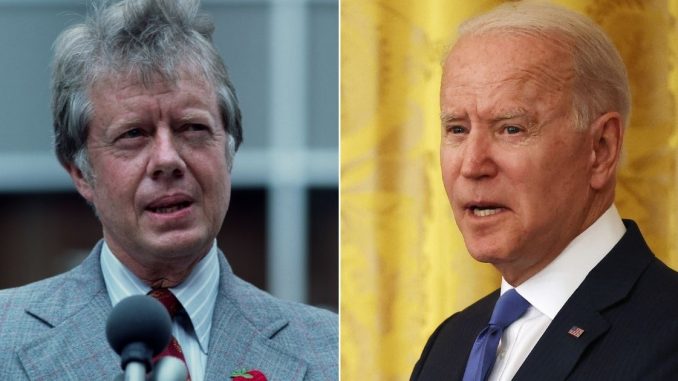
The television game show “What’s My Line?” which aired from 1950 to 1975, featured celebrity panelists who asked guests a series of questions to determine their line of work. On each show, the first couple of guests, not known well enough to be recognized by face, stood in full view. The panelists were then blindfolded because the final guest — the “mystery guest” — was too famous not to be instantly identified.
In the Dec. 13, 1973, episode, the mystery guest was Academy Award winner Joan Fontaine. But that evening’s first guest was a fellow who simply called himself “X.” No blindfolds were necessary. One panelist asked him if he was in the fashion industry; another, if he recruited nuns.
That obscure guest was Jimmy Carter.
Eight months later, Richard Nixon would resign the presidency of the United States, and his successor, Gerald Ford, would pardon him. Too many Americans wanted to see Nixon suffer and wouldn’t forgive Ford for denying them the privilege. Accordingly, three years after being a game show enigma, Carter was elected president.
In great part, Carter won because he was the “anybody but Ford” candidate.
Long before the word “stagflation” re-entered our national lexicon after a decades-long absence, and before comparisons between the Afghanistan debacle and the Iran hostage crisis began spreading like prairie fire, I dubbed Joe Biden “Jimmy Carter, Part 2,” but for neither of those reasons.
The similarity between our 39th and 46th presidents was fairly obvious to me because the latter is the last “anybody but” candidate to unseat an incumbent president since the former.
Granted, Biden was a lot better known than Carter when he ran for president. For one thing, he had been vice president for eight years. Nonetheless, although some presidential hopefuls win their party’s nomination because of their potential to be transformational — Kennedy, Reagan, Obama, Trump — others are simply the “anybody but” candidate, inspirational only in the sense of being the converse of their predecessor.
Since Carter, seven incumbents have run for re-election; four won, and three (including Carter himself) lost. Those seven elections, the challenger’s name appearing first, were: Ronald Reagan vs. Carter (1980), Walter Mondale vs. Reagan (1984) Bill Clinton vs. George H.W. Bush (1992), Bob Dole vs. Bill Clinton (1996), John Kerry vs. George W. Bush (2004), Mitt Romney vs. Barack Obama (2012), and Biden vs. Donald Trump (2020).
As challengers, Reagan and Clinton were not “anybody but” candidates. Each was transformational in his own way.
Reagan campaigned on lower taxes, smaller government and military might, promising to reverse both Lyndon Johnson’s Great Society of the 1960s and the domestic and foreign policy inertia of the 1970s.
As presidents, they enjoyed high levels of peace and prosperity, and so there weren’t very many “anybody but him” cries about either one.
That leaves Dole, Kerry, Romney and Biden as “anybody but” challengers who faced troubled incumbents. Biden was the only one who won.
Then, there are the “it’s their turn” candidates. The ones chosen mostly because they’ve been around long enough and the party nomination is a reward for their years of service. Mondale, Dole, Kerry and Romney fit that bill.
Throughout our history, several contenders have energized others to join their party. But almost no one ever said “I’m a Mondale Democrat” or “I’m a Romney Republican.”
Other recent “it’s their turn” challengers include Al Gore in 2000, John McCain in 2008, Hillary Clinton in 2016 and Biden in 2020. Again, of all of them, only Biden won.
As both an “anybody but” and an “it’s my turn” candidate, Biden’s win was just as improbable as Carter’s was, if not more so. Many Biden voters have spent the last few months flying high in their Trump Riddance Bender but have now come crashing down, suffering from a Biden Realization Hangover.
The types of domestic and international crises festering nowadays eerily resemble ones we haven’t encountered since Carter was in the Oval Office.
